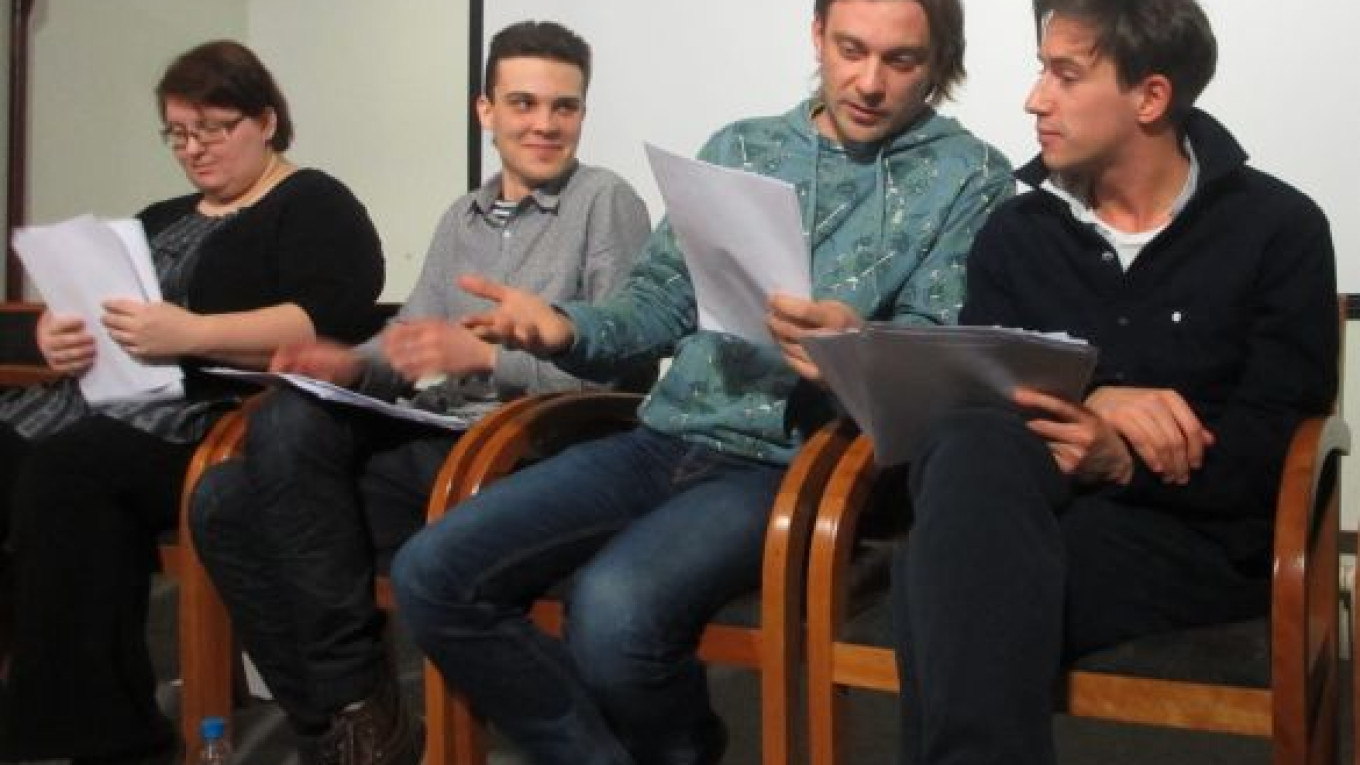"A lot of people these days are finding parallels between the present and the 1930s, but the real connection I see is between the present and 1968."
Playwright Mikhail Durnenkov made that comment to me as we chatted Friday prior to the beginning of an evening called "1968. Prague Spring" at the Memorial Society on Karetny Ryad. Durnenkov, along with playwright Yevgeny Kazachkov and arts manager Katrina Menshikova laid the foundations for the program in November when they traveled to Prague to join Czech translator and scholar Tereza Krcalova in order to conduct a master class in the writing of plays based on historical documents and events.
The Friday reading of some of the plays that came out of that experience — an attempt to take a fresh look at the roles played by both Russians and Czechs in the crushing of Czechoslovakia's Dubcek government by Soviet military forces — was the first major event to be held in the Russian capital. The plan is to collate all of the plays written by the participating Czech and Russian authors in June and see what may come of them.
"We want to approach various theaters," Durnenkov told me, "Kirill Serebrennikov at Gogol-Center, for example. We could do something at Teatr.doc, but then we would be doing it for people who are already with us. What we want is to expand the reach of works like this."
The texts presented on Friday were written by three Czech playwrights, Roman Sikora, Wojtech Barta and Pavel Trtilek, and two Russian writers, Durnenkov and Kazachkov. Eventually, Russian playwright Maksym Kurochkin is also expected to be involved.
All five of the texts currently available were edited into a single, not-quite seamless, 75-minute reading. Among others, topics included a Soviet soldier serving in the small Czech town of Zaijcev; the contemporary Czech hockey hero Jaromir Jagr who wears the number 68 for the Dallas Stars of the National Hockey League; the two defeats of the Soviet hockey team by the Czechoslovakians during the 1969 World Ice Hockey Championships; and a contemporary Russian man considering emigrating to the Czech Republic getting nowhere as he tries to talk to his parents on skype about their recollections of the Prague Spring events.
Perhaps the funniest and hardest hitting of all the texts was Sikora's sarcastic bit about Jagr. In just a few strokes the folkloric telling and retelling of the tale about why Jagr chooses to wear the number 68 grows from a simple explanation that one of his grandfathers perished during the Soviet invasion into a wildly exaggerated declaration that his entire family and home village were wiped out. It is, in miniature, an effective portrait of how emotion warps memory beyond recognition, especially when mixed with anger.
Durnenkov's short piece served a similar function, only moving in the opposite direction. In this case a Russian journalist skypes his parents to hear their memories of the events of 1968. His mother, however, only complains about how she saw a gay friend of his kissing a man on television during the 2012 Occupy Abai protest in Moscow, and his father assures him that the Czechs were thrilled to have the Soviet army come to their rescue.
During a discussion following the reading many Russians admitted that the true historical value of the Prague Spring is lost in Russia.
Nina Falkovskaya, a Russian translator of Czech, told of acquaintances being impressed when they learned that she had translated for Jagr. She told them she has also translated for Vaclav Havel, to which the response was, "Who is that?"
"When you read letters and texts from 1968, you feel the same atmosphere that we have today," Durnenkov suggested in concluding the discussion. "The same doors closing. The same screws being twisted. The same pressures being applied."
In an unrelated event, the Memorial Society was raided by Russian police and tax inspectors earlier in the day before the Czech-Russian event was held. The reason for that, according to the , is suspicion on the part of Russian authorities about Memorial's funding. A recent Russian law declares that foreign-funded non-governmental groups (NGOs) involved in politics in any way are required to register as "foreign agents" — a term which, historically in Russia, has been a reference to spies.
www.johnfreedman.webs.com
Related articles:
A Message from The Moscow Times:
Dear readers,
We are facing unprecedented challenges. Russia's Prosecutor General's Office has designated The Moscow Times as an "undesirable" organization, criminalizing our work and putting our staff at risk of prosecution. This follows our earlier unjust labeling as a "foreign agent."
These actions are direct attempts to silence independent journalism in Russia. The authorities claim our work "discredits the decisions of the Russian leadership." We see things differently: we strive to provide accurate, unbiased reporting on Russia.
We, the journalists of The Moscow Times, refuse to be silenced. But to continue our work, we need your help.
Your support, no matter how small, makes a world of difference. If you can, please support us monthly starting from just $2. It's quick to set up, and every contribution makes a significant impact.
By supporting The Moscow Times, you're defending open, independent journalism in the face of repression. Thank you for standing with us.
Remind me later.


